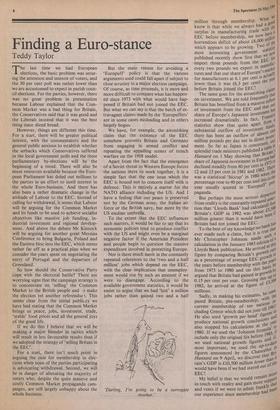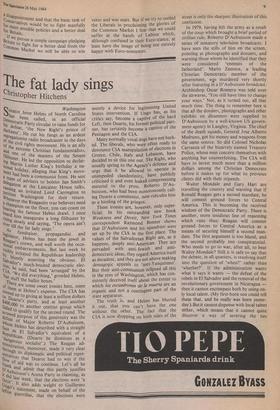Finding a Euro-stance
Teddy Taylor
The last time we had European elections, the basic problem was secur- ing the attention and interest of voters, and the 30 per cent poll was rather lower than we are accustomed to expect in parish coun- cil elections. For the parties, however, there was no great problem in presentation because Labour explained that the Com- mon Market was a bad thing for Britain, the Conservatives said that it was good and the Liberals insisted that it was the best thing since sliced bread.
However, things are different this time. For a start, there will be greater political interest, with the commentators and the general public anxious to establish whether the setbacks which Conservatives suffered in the local government polls and the three parliamentary by-elections will be the beginning of a trend. There will also be more resources available because the Euro- pean Parliament has doled out millions to the parties in an effort to instil interest in the whole Euro-business. And there has also been a rather dramatic change in the attitude of Labour to the EEC. Instead of calling for withdrawal, it seems that Labour will be arguing for the Common Market and its funds to be used to achieve socialist objectives like massive job funding, in- dustrial investment and regional develop- ment. And above the debate Mr Kinnock will be arguing for another great Messina Conference to bring Bulgaria, Poland and the Eastern bloc into the EEC, which seems rather far off as a practical plan when we consider the years spent on negotiating the entry of Portugal and the departure of Greenland.
So how should the Conservative Party cope with the electoral battle? There are worrying signs that the campaign strategy is to concentrate on 'selling' the Common Market to the British people and o make the election yet another referendut 1. This seems clear from the initial publicity we have had stating that the Common Market brings us peace, jobs, investment, trade, 'stable' food prices and all the general joys of the good life.
If we do this I believe that we will be making a major blunder in tactics which will result in less favourable results than if we adopted the strategy of 'selling Britain in the EEC'.
For a start, there isn't much point in arguing the case for membership in elec- tions when none of the parties participating is advocating withdrawal. Second, we will be in danger of alienating the majority of voters who, despite the quite massive and costly Common Market propaganda cam- paigns, are still largely unhappy about the whole business. But the main reason for avoiding a 'Europuff' policy is that the various arguments used could fall apart if subject to close scrutiny in a major election campaign. Of course, as time proceeds, it is more and more difficult to compare what has happen- ed since 1973 with what would have hap- pened if Britain had not joined the EEC. But what we can say is that the batch of ex- travagant claims made by the 'Europuffers' are in some cases misleading and in others largely bogus.
We have, for example, the astonishing claim that the existence of the EEC somehow prevents Britain and Germany from engaging in armed conflict and repeating the appalling scenes of trench warfare on the 1918 model.
Apart from the fact that the emergence of a Soviet threat to Western Europe forces the nations there to work together, it is a simple fact that the one issue which the EEC is bound not to concern itself with is defence. This is entirely a matter for the NATO alliance including the US. And I have a feeling that our peace is preserved not by the German army, the Italian air force or the British navy, but more by the US nuclear umbrella.
To the extent that the EEC influences such matters, it would be fair to say that its economic policies tend to .produce conflict with the US and might even be a marginal negative factor if the American President and people begin to question the massive expenditure involved in protecting Europe.
Nor is there much merit in the constantly repeated references to the 'two and a half million' jobs which depend on the EEC, with the clear implication that unemploy- ment would rise by such an amount if we were to disengage. According to the available government statistics, it would be easier to argue that we had 'lost' a million jobs rather than gained two and a half 'Darling, I'm going to be a surrogate mother.'
surplus in manufacturing trade with the EEC before membership, we now ha" horrendous deficit of about 8000 which appears to be growing. Two oft.h" most interesting government statisti: published recently show first that v•'e no t import three pounds from the EEC cle,. every two pounds we export in inanalta:t tures and that our share of Europe's ntall.,";, for manufactures at 6.1 per cent is actual" lower than it was (6.3 per cent) the Y before Britain joined the EEC!
The same goes for the astonishing elajkift
on investment. We are told frequently too, Britain has benefited from a massive 01°4 of investment from the EEC and that °" share of Europe's Japanese investment has increased dramatically. In fact, Treastill statistics show that quite apart fromfund s, i substantial outflow of investment e there has been an outflow of almost of million pounds per day net in direct inves.,; ment. So far as Japan is concerned, e'irt splendid trade ministers published a taten•5 Hansard on 1 May showing that Brit'd share of Japanese investment in EuroPe“"to declined steadily from 80 per cent in 191.1h3- ete 12 and 13 per cent in 1981 and 1982. was a statistical 'hiccup' in 1980 whe' the percentage rose to 40 per cent and this j5 year usually quoted in 'Europufr P paganda.
But perhaps the most serious dePartlirt. from reality is the constantly repeated asset. tion that 'Lloyds Bank' had calculated ts''00
Britain's GDP in 1982 was about if million greater than it would have been Britain had not joined the EEC. To the best of my knowledge no hank that ever made such a claim, but it is true a Mr Christopher Johnson made such ca calculation in the January 1983 Lloyds Bank publication. He arrived at t to figure by comparing Britain's growth brain as a percentage of average EEC growt;g5 the years before membership with the .31 he from 1973 to 1980 and on this bas's b, argued that Britain had gained in growth to 0.15 per cent per year. Grossing this ti13400 edition oh' is 1982, he arrived at the figure of f3') millions. Sadly, in making his estimates, hei..e°: pared Britain, pre-membership, with the pared
membership of ten
nations eluding Greece which did not join till 19 to He also used 'growth per head' figures d produce national growth conclusions eat also also stopped his calculations at the Y:eto 1980. If we used the 'Johnson formula a if include only the original Six before 1983'1-, we used national growth figures an ite most important, we used the up-to in figures announced by the Chancellor Hansard on 9 April, we discover that 1311i; tain's GDP is £10,500 million lower thant, EEC! e EwEouldl have been if we had stayed out of tH My belief is that we would remain in touch with reality and gain moresuPPL'al; and votes if we were to admit frankly tn our experience since membership had bee
aclisaPPointment and that the basic task of conservatives would be to fight manfully
for more sensible policies and a better deal for Britain.
lf we pursue a simple campaign pledging Britain tO fight for a better deal from the Corornon Market we will be able to win votes and win seats. But if we try to outbid the Liberals in proclaiming the glories of the Common Market I fear that we could suffer at the hands of Labour which, although confused in their Euro-stance, at least have the image of being not entirely happy with Euro-nonsenses.















































 Previous page
Previous page